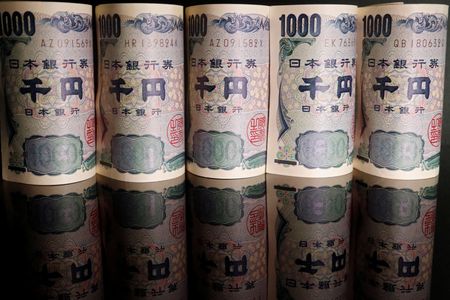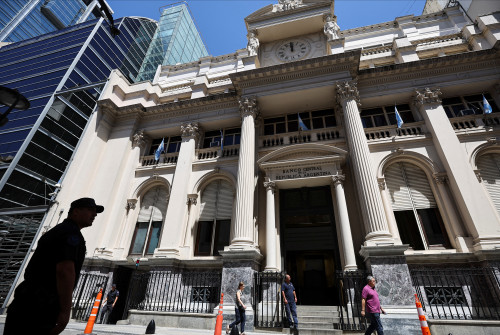By Leika Kihara
TOKYO (Reuters) – The Bank of Japan is caught in a dilemma with growing prospects of sustained inflation heightening the case for an early tweak to its yield control policy, despite Governor Kazuo Ueda’s reassurances he would “patiently” maintain massive stimulus.
The first test will come at the central bank’s policy meeting on July 27-28, when the board is likely to revise up its inflation forecasts and signal its conviction that a demand-driven rise in prices backed by wage growth is taking hold.
The BOJ has been internally discussing the idea of tweaking yield curve control (YCC) as early as this month, though the talks are preliminary and no final decision has been made, said two sources familiar with its thinking.
“It’s true discussions have been ongoing. But there’s no clarity on what the final decision would be,” said one of the sources on the chance of a policy shift in July.
Any tweak will likely be a minor adjustment to YCC, such as raising a cap set for the yield target, rather than an overhaul of ultra-easy policy, said a second source. The sources spoke on condition of anonymity due to the sensitivity of the matter.
Such fine-tuning alone would likely do little damage to Japan’s economy, with massive money pumping by the central bank keeping mortgage rates and corporate borrowing costs very low.
But even a small change to Japan’s prolonged ultra-loose policy could upend global financial markets as it would symbolise how stubbornly high inflation is finally forcing the BOJ to relent.
While other global central banks have been aggressively raising interest rates to curb surging prices, the BOJ has been a conspicuous outlier, arguing that the recent jump in inflation reflects external factors like oil prices and may not last.
Lately, however, BOJ policymakers been dropping signs that inflation is being increasingly driven by improving consumer demand. If that strength can be sustained, it could give Ueda justification to pivot away from his predecessor’s massive monetary stimulus.
With inflation now exceeding the BOJ’s 2% target for more than a year, some market players are also betting on an early tweak to YCC — a policy that guides the 10-year bond yield around zero with a cap of 0.5%.
CREDIBILITY ON LINE
There is no consensus within the BOJ on how soon it should start dialing back stimulus.
Proponents of early action point to the rising cost of YCC, such as market distortions caused by the BOJ’s huge bond buying.
While off its latest lows, the weak yen has also kept pressure on the BOJ to phase out stimulus by fueling public discontent over the rising cost of fuel and food imports.
Heightening inflation expectations and changes in corporate price-setting behaviour add to the arguments for a near-term shift.
But others in the BOJ, including Ueda, have warned of the danger of responding too hastily to budding signs of change in Japan’s deflationary mindset.
Ueda has said he was not fully convinced yet that inflation will sustainably hit 2% on the back of steady wage growth, suggesting the key was whether wages and prices will keep rising next year.
The picture looks patchy. While a tightening job market could pressure firms to keep hiking pay, soft global demand could hurt profits and discourage firms from raising salaries.
There is also uncertainty on whether consumption, still being driven by pent-up demand after the removal of pandemic curbs, can withstand the pain from rising living costs, analysts say.
Waiting for clues on next year’s wage outlook could take at least until the final quarter of this year, say two other sources familiar with the BOJ’s thinking.
Shifting policy too soon would also run counter to Ueda’s repeated remarks calling for the need to “patiently” sustain easy policy, and put his credibility on the line just three months in the job.
“A July policy tweak would contradict the logic the BOJ had been using to justify keeping easy policy,” said Naomi Muguruma, senior market economist at Mitsubishi UFJ Morgan Stanley Securities.
“In any case, the decision could be a close call.”
(Reporting by Leika Kihara; Additional reporting by Tokyo newsroom; Editing by Kim Coghill)





